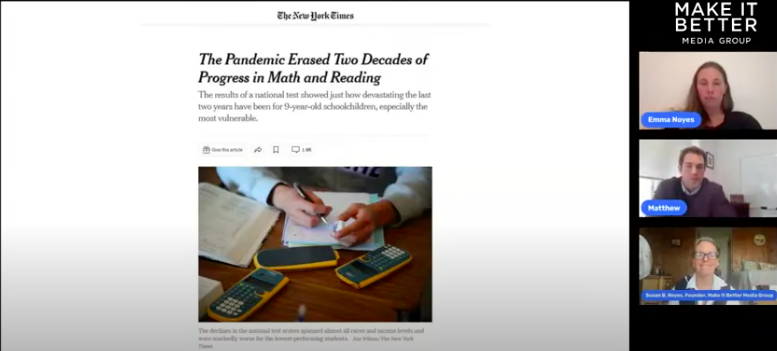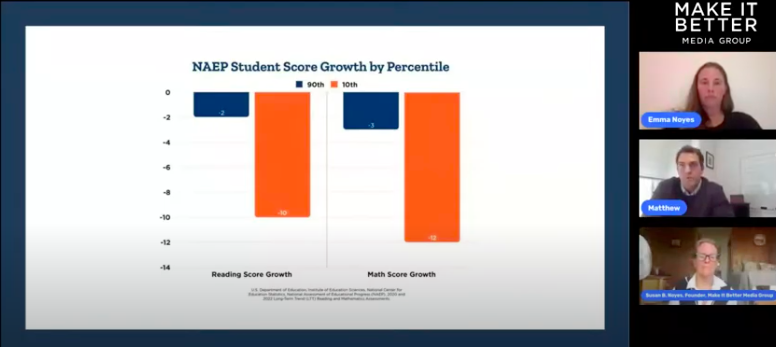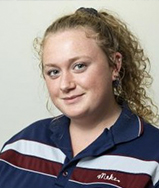In the more than two years since the onset of the pandemic, many have felt the burdens and constraints of an adapted life. Few groups have felt that more entirely than students across the country, where virtual learning and adopted academic habits have left them short of their benchmarks. To discuss how we fight back from this, Academic Approach Founder and CEO Matthew Pietrafetta, Ph.D, and Author Emma Noyes participated in a virtual event on October 11, moderated by Susan B. Noyes, the founder and Chief Visionary Officer of Make It Better Media Group.
Pietrafetta navigated the conversation across three main topics — posed as questions — centering on student progress, skill applicability and the role of parents.
How are students doing academically?
In early September, The New York Times published “The Pandemic Erased Two Decades of Progress in Math and Reading,” which sent panic into some parents and educators. Though the claim holds true — this most recent drop in reading is the largest since 1990 and the largest in math since the National Assessment of Educational Progress was founded in the 1970s, according to the NAEP. Yet, Pietrafetta says this information is not yet a cause for alarm.

“Is this a cause for panic? No,” Pietrafetta said. “But does it mean looking at every bit of data [we] can, trying to make sense of it and trying to understand how [children] are progressing? Yes.”
One example he gave was that in previous years, to get “about five points of ACT growth,” on average, would require 20 hours of instruction and two to three practice tests. In the current academic landscape, that same growth would require five additional hours and one to two more practice tests.
“What does that tell us? Well, everyone has been impacted, according to this data. There’s been a downward trend across all student performance but at the lower levels of performance — perhaps where students were most vulnerable and needed more foundational skills developed and were maybe struggling more with acquiring skills … they were impacted more profoundly,” Pietrafetta said.
Academic Approach’s response to this, or any other lapse in the pursuit of learning, is to focus on the entirety of a student’s understanding. They practice Teaching Beyond The Test, which coaches students beyond what will get good scores to also establish skills and solutions they can apply to their classrooms and workplaces.

Why do these skills matter?
Critical reading skills; drawing evidence-based conclusions; mathematical and creative reasoning, to name a few, are core elements that students should familiarize themselves with as they graduate to more challenging course work and into the workforce. Instilling a process that fosters practical connection between the skills being learned and being used is key, Pietrafetta noted.
As a former student of Academic Approach, Noyes went on to express the impact these fine-tuned skill sets have had on her career, and how that can separate a person from the pack of other applicants — or, in her case, other authors.
She continued that for many students, regardless of test scores, the pressure to excel academically can also be overwhelming — whether those factors are external, or oftentimes, internal.
“I would always want to advocate for as much self-compassion [as possible]. When I think about going to a mediator [at Academic Approach], it’s more like going to a mentor-type figure to almost cut myself some slack,” Noyes said.
Becoming “authentically interested” in the material — Noyes and Pietrafetta agreed — is a positive side effect of this type of learning, where the encouragement lies in the application of the long-term skill, not the short-term commitment to it “up to the point of usefulness.”
As someone who has worked in the field of education in many capacities, Pietrafetta’s role at Academic Approach was not that of a teacher or parent, but as a “safe audience” for students to ask questions and navigate their academic pursuits free of judgment.
“So you’re not telling the student what to do but you’re asking them what they should do, so they own it. Ownership is so important in really taking true accountability in learning,” Pietrafetta said. He also emphasized the importance of students telling their own story on how the pandemic and the shift in learning has affected them. Allowing them the agency to decide whether they are up to the level or not will only lead to future self-advocacy and trust in oneself, they both added.
View this post on Instagram
How can parents help?
The panel deliberately spent a significant portion of the event discussing how the decline in academic performance and skill retention affects the roles of the parents.
Pietrafetta said a parent’s approach to getting their child back on track should be well-informed and in the best interest of the student — as reinforced by Susan B. Noyes’ question on how parents can be “advocates” for their child and avoid accusation and frustration when working with teachers and administration.
His advice is to focus on the data; observe students’ patterns; and be communicative with teachers about the best approach.
- Take time to gather your child’s scores and progress data, does it “tell a story”?
- Foster conversations with teachers; go to school events, like parent-teacher meetings; ask questions to the people who are the most familiar with your child’s academics.
- Observe their academic behaviors at home. When do they do their work? Are they scheduled or do they let it pile up? Do they talk to teachers or not?
Additionally, in the age of COVID, he suggests noting how their behaviors differ from pre-2020 and if there are signs they are committed to the newer, bad habits or to fixing them.
For more information about the programs and services offered by Pietrafetta and his team, visit the Academic Approach website.
To find Emma Noyes’ latest work and learn more about her career, visit the Emma V.R. Noyes website.
Watch the virtual event here:
More from Better:
- 5 Education Tips and Insights from Purdue University President and Former Indiana Governor Mitchell E. Daniels, Jr.
- How To Help: This October We Honor Mental Health Awareness — Support Your Loved Ones and Community
- Give Time, Things, Support: 5 Ways To Support Those in Need in Chicago and the Suburbs As Cold Weather Approaches

Margaret Smith is a Chicago-based writer and editor with a passion for socio-political storytelling about their community. They are a graduate of Columbia College Chicago.

